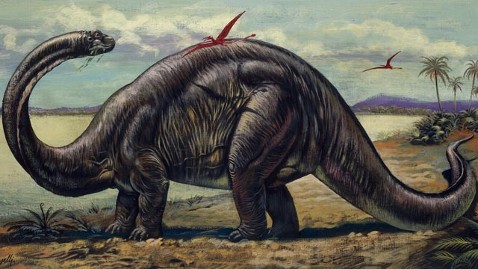Dinosaurs Passed Gas, Perhaps Enough to Warm Earth's Climate

Artist's conception of Apatosaurus. De Agostini Picture Library/De Agostini//Getty Images.
Please excuse us. Scientists from the U.K. say dinosaurs probably had gas, just as animals and humans do today, and they may have had enough of it that it actually warmed the Jurassic climate, more than 100 million years ago.
David Wilkinson of Liverpool John Moores University led a team, writing in the journal Current Biology, that tried to estimate how much gas could have come from sauropods - the giant long-necked vegetarian dinosaurs such as Apatosaurus (previously known as Brontosaurus) - who roamed many swamps, chomping on greens to get enough calories. It would have been a high-fiber diet, and you know what that can do.
Bathroom humor aside, Wilkinson and his colleagues estimate that the dinosaurs gave off something like 570 million tons of methane every year. They emphasize that they're heaping one estimate on top of another - there's no saying, for instance, what microbes may have thrived in a typical dinosaur's gut, or just how many ferns your friendly neighborhood sauropod could have eaten in a day.
But if they're right, the dinosaurs gave off about as much methane as gets into the atmosphere today from bogs, natural gas pumping and - hold your horses - livestock on modern-day farms.
Methane happens to be a heat-trapping gas, like carbon dioxide - and it's considerably more potent, molecule per molecule. Hence the suggestion that the dinosaurs may have helped warm their world.
There are many other factors, Wilkinson and his team point out, that would have contributed to the already-warm climate when the dinosaurs lived. And scientists say carbon dioxide today is much more plentiful in the atmosphere than methane.
But still, if you figure that the average Apatosaurus could have weighed something like 20,000 pounds, and spent most of the day eating to keep up its body weight - well, no wonder Wilkinson's paper has been a hot topic.